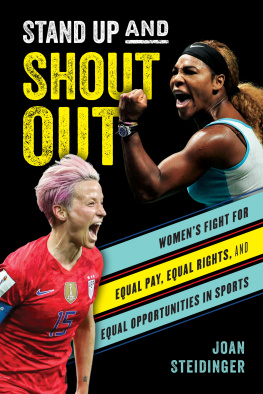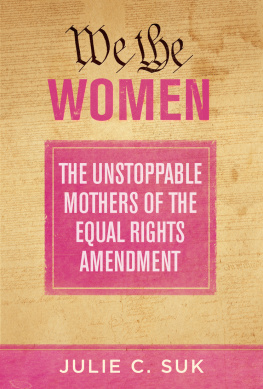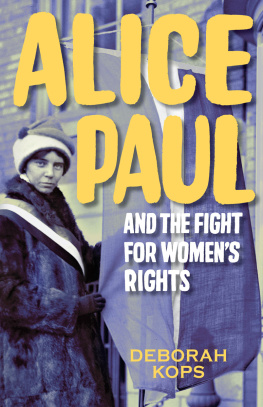Founder of the international womens rights organization Equality Now, Jessica Neuwirth is the former director of the New York Office of the United Nations High Commissioner for Human Rights. She is the founder and director of the recently formed ERA Coalition and of Donor Direct Action, an initiative to support womens rights organizations around the world. A graduate of Yale College and Harvard Law School, she lives in New York City.
Gloria Steinem is a world-renowned feminist organizer and writer who co-founded a variety of organizations in the American womens liberation movement, including Ms. magazine, the Ms. Foundation for Women, and the National Womens Political Caucus. Her books are published in the United States and other countries. In recent years, she helped found the Womens Media Center, Donor Direct Action, and the ERA Coalition. She travels widely in the United States and around the world as a speaker and organizer. In 2013, she was awarded the Presidential Medal of Freedom. She lives in New York City.

One of many buttons from the 1970s ERA campaign highlighting its patriotism.


2015 by Jessica Neuwirth
Foreword 2015 by Gloria Steinem
All rights reserved.
No part of this book may be reproduced, in any form, without written permission from the publisher.
Requests for permission to reproduce selections from this book should be mailed to: Permissions Department, The New Press, 120 Wall Street, 31st floor, New York, NY 10005.
Published in the United States by The New Press, New York, 2015
Distributed by Perseus Distribution
LIBRARY OF CONGRESS CATALOGING-IN-PUBLICATION DATA
Neuwirth, Jessica, author.
Equal means equal : why the time for an equal rights amendment is now / Jessica Neuwirth ; foreword by Gloria Steinem.
pages cm
Includes bibliographical references.
ISBN 978-1-62097-048-5 (e-book) 1. Equal rights amendmentsUnited States. I. Title.
KF4758.N48 2015
342.7308'78dc23 2014029578
The New Press publishes books that promote and enrich public discussion and understanding of the issues vital to our democracy and to a more equitable world. These books are made possible by the enthusiasm of our readers; the support of a committed group of donors, large and small; the collaboration of our many partners in the independent media and the not-for-profit sector; booksellers, who often hand-sell New Press books; librarians; and above all by our authors.
www.thenewpress.com
Book design and composition by dix!
This book was set in Scala
10 9 8 7 6 5 4 3 2 1
This book is dedicated to my mother, Gloria Neuwirth, who graduated from Yale Law School in 1958 only to be told when she interviewed with a New York law firm, We dont hire women, but youre a pretty girl so wed be happy to talk to you. The bar association would not hire herthey said they couldnt hire a woman because they had evening meetings. Today, at the age of eighty, she is working full time as a partner in the law firm of Davidson, Dawson & Clark. She is named in Best Lawyers in America and has been listed among New York Super Lawyers for the past seven years running. She is the best mother anyone could ever hope for, and I am eternally grateful for her unconditional support in every way. I also want to pay tribute to my late father, Robert S. Neuwirth, who gave me every opportunity in the world.
CONTENTS
I want to pay tribute to the many courageous women who have suffered the injustice of discrimination and taken action to defend and promote the fundamental right to sex equality. I hope to honor the memory of Rebecca, Katheryn, and Leslie Gonzales, three beautiful girls from Colorado who lost their lives at the ages of ten, eight, and seven because our law failed to protect them from the deadly violence of their father, and failed again to deliver justice to their mother, Jessica Gonzales (now Lenahan), following this tragedy.
Special thanks to Catharine MacKinnon, Robin Morgan, and Gloria Steinem, whose brilliance has been a constant source of inspiration to me and countless others. They have guided me over the past twenty years in all my endeavors and have helped me tremendously with this book, for which I am deeply grateful. It is truly an honor to work with them and be part of a vision they have done so much to forge, and continue to advance, for the benefit of women across the country and around the world.
This book is based on extensive research done over the past year by Paul, Weiss, Rifkind, Wharton and Garrison, with great thanks to the firm and to Maria Vullo, Liza Velazquez, Erin Smith Dennis, and the rest of the team who have served as pro bono counsel to the Coalition for the ERA.
Thanks also to Chai Feldblum, Roberta Francis, Kamala Lopez, and Eleanor Smeal for taking the time to read drafts of this book and share their comments and advice with me, and to Dina Bakst, Taina Bien-Aim, Jane Connors, Elizabeth Evatt, Bettina Hager, Kyung-wha Kang, Jane Levikow, Leanne Littrell DiLorenzo, Laura Neuwirth, Navi Pillay, Diane Rosenfeld, Richard Rothman and Melissa Salten, Pamela Shifman, Linda Wharton, and Liz Young. Thanks to Lauren Turner and Elizabeth Hague for research assistance.
It is a privilege to have this book published by The New Press, a unique publishing company I have long admired. I want to particularly thank Diane Wachtell, as well as Jed Bickman, Julie Enszer, and Sarah Fan for guiding me through the process of writing a book for the first time.
Gloria Steinem
People could make it against flood and pestilence, but not against the laws; they went under.
Jorge Amado
Once upon a time, I believed that as an American, I was protected by the Constitution. When my schoolbooks cited it as the founding document of democracy, I assumed that everyone was equal before the law. Of course, I knew that the Constitution hadnt ended slavery or included womennot even the wives, daughters, and mothers of the Founding Fathers. Still, I assumed those wise men were doing the best they could in their time. After all, even ancient Athensthe birthplace of democracy, according to my schoolbookshad slavery and no role for women other than housewife, courtesan, or slave.
It took centuries of revolt to open up our incomplete democracy. Slavery was ended by a Civil War; the Constitution was amended so once-enslaved men could vote; and another half-century was spent marching, lobbying, and going on hunger strikes before white and black women could vote. Even then, Southern states kept black women and men away from the polls with violence, and it took a long and brave civil rights movement to get the federal government to enforce its own laws. Today, a patchwork of state laws still makes it more confusing and difficult to vote in this country than in any other developed democracy in the world. Voter turnout is lower here than in, say, India, with all its poverty and illiteracy. Recently, officials from Ohio to Texas and North Carolina have manipulated rules to keep the less powerful out of the voting booth, the one place on earth where they could equal the powerful. As I write this, the League of Women Voters has just successfully challenged the Republican-dominated Florida state legislature for redrawing congressional districts to benefit Republicans.
Next page






